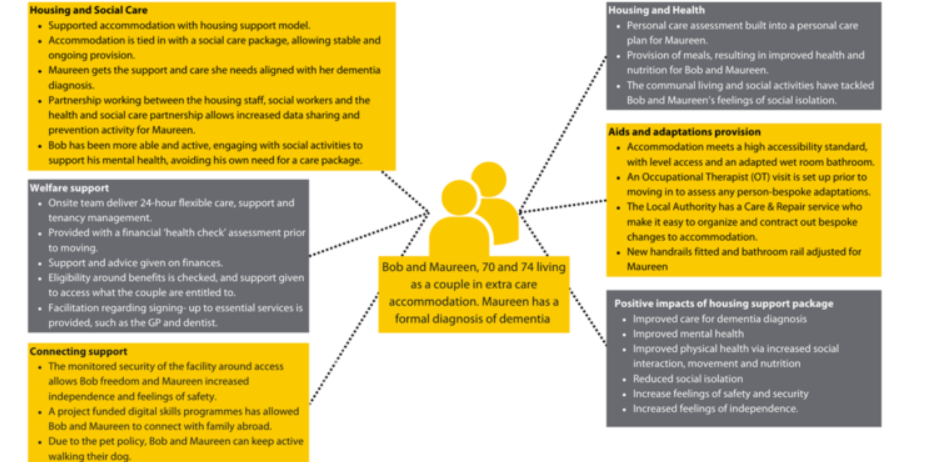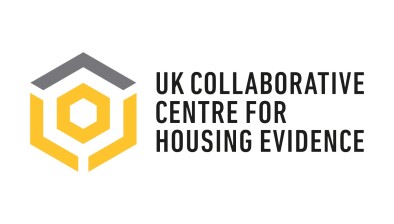Beyond four walls: exploring the full scope of housing support

Prof Ken Gibb and Dr Vikki McCall
Prof Ken Gibb and Dr Vikki McCall discuss the importance of accounting for housing support services, highlighting the critical role they play in supporting independent living and integrating housing with health and social care while also emphasising the challenges in defining and tracking these services and the need for comprehensive research to understand costs and benefits.
Accounting for Housing Support
There is an understandable tendency to focus on big ticket items like the Affordable Housing Supply Programme or the future of the entire private rented sector. But we should also recognise and debate the best ways to provide those vital housing services that do not make such a big policy noise but are nonetheless life-changing. A pertinent example is Housing Support.
Our recently published paper suggests that not only does Housing Support play such a critical role, supporting independent living, remaining in one’s home, integrating housing, health and social care and also, providing the glue that makes housing & care packages and investments work. For the people concerned we can only overestimate the value such programmes play with difficulty. Yet, they hardly scratch the commentariat surface.
Arguably, this is because since the government ended ring fenced supported housing, the remaining housing support functions have become disparate, less visible, uncoordinated and harder to track and account for. Multiple small programmes, and even one or two reasonably sized policies (like adaptations), are vulnerable to other changes in the system that shift resources, change what is possible and can render well-functioning interventions because priorities change elsewhere, not recognising the value that Housing Support offers.
In our report, we identify ten plus policies that form the bundle of contemporary housing support in Scotland, ranging from Housing First to Care and Repair handyman services. They are difficult to clearly account for or to estimate accurately their costs to the public purse or the benefits that they make possible. And we know that practitioners know how valuable housing support is; it is just that there are not sufficient advocates taking a holistic view of what it achieves. This political deficit adds to the vulnerabilities and risks that the programme and, most importantly, its actual and potential clients face.
Challenges in defining Housing Support
It is very tricky to narrow down the wrap-around services that exist around the provision of housing. There is such a wide range of Housing Support activities, with a variety of groups and services involved. Housing Support is hyper-diverse, with national and local divergence, which creates challenges in defining and mapping activity. Due to these challenges around definition, these Housing Support services have been easy to overlook.
Academic insights into the different types of supportive housing and Housing Support activity are linked to diverse models alongside fragmented conceptual understandings of housing support. There are also a variety of groups and services involved in the wide-ranging and varied forms of provision.
The research report offers insights from discussions with key stakeholders, who define Housing Support as:
The ‘basket of activities’ around Housing Support is perceived to be about prevention, such as for example falls prevention, as well as advice around emergences, how to keep people safe, supporting people’s well-being, adapting environments alongside maintaining the building and properties.
Therefore, given the diversity of activity around Housing Support, we can see that it is a dynamic process that encompasses activity that goes beyond simply accessing, providing, and maintaining a house, to centralise person-centred interaction and facilitation of services.
So then what does Housing Support look like?
Housing activity framed as an ‘enabler’, ‘facilitator’, ‘provision’, ‘support’, or ‘assistance’ widens the categorisation of any linked delivery package. There are several models of support that aim to enable positive outcomes across groups and tenure that vary in scale:

In the range of evidence available, there are positive outcomes related to housing support activity that are often reported. Qualitative evidence offered is much stronger than cost/benefit and economic impact data.
Given the hyper-diversity of Housing Support, the report outlines some interesting models of housing support provision. One of the ‘Models in the Spotlight’ includes the Floating Housing Support, based in Perth and Kinross, which is a model that has developed to provide a wide range of groups with diverse needs to enable shorter term intervention to ensure tenancy sustainment.
The idea of a ‘floating’, flexible service that aligns with peoples’ needs very much aligns with the ‘basket of activities’ approach to Housing Support. Here the focus is on intervention, de-escalation and prevention services that provide temporary support at the point of crisis. Without Floating Housing Support, the people referred may lose their tenancy without assistance and need – much more expensive – health and social care packages. In Perth and Kinross alone, from 1st April 2021 to 31st March 2022 there were 623 referrals, with the vast majority related to mental health support with less than 20% being escalated into wider health and social care services.
The report also offers Vignettes (fictionalised individuals based on reality) that allow the visualisation of these services brought to life and how they can wrap around individuals.

From this example of Bob and Maureen above, we see the range of activities of Housing Support can vary between housing and social care, welfare, digital skills, health care, aids, adaptations that all improve feelings of independence, safety, physical and cognitive health.
Final Thoughts
We have identified the direct and preventative (savings to other parts of the public purse and society) of effective outcomes wholly or in part influenced by housing support measures such as facilitating hospital discharge, protecting independent living and providing wrap around services for people entering settled housing, among others. The paper reviews a wide, largely grey, literature that reports specific cost benefit analysis that suggests for instance that housing support solutions that keep people in their homes provide significant and progressive savings and net benefits to clients and taxpayers alike.
But we need to do much more to promote and better understand Housing Support if it is to be secured and to prosper. We need to do further comprehensive research that will, first, identify the different strands of the Housing Support models in the bundle we have identified, identify who is responsible for them and how much they cost globally and where those financial accountabilities lie. Second, we need to build a comprehensive picture of the typical costs and benefits that Housing Support offers, taking proper account of the savings to other parts of the public purse and doing so in a standardised way.
- Prof Ken Gibb is director and principal investigator of the UK Collaborative Centre for Housing Evidence (CaCHE). Dr Vikki McCall is a senior lecturer in social policy and housing at the University of Stirling.
This article was originally published on the CaCHE website








